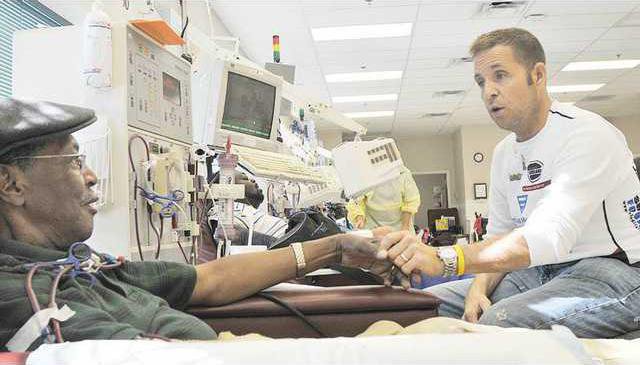Shad Ireland hasn’t let a little thing like kidney failure get in his way.
After competing in the Ironman Triathlon and several others, Ireland is using his success to encourage others who are suffering from kidney disease.
Ireland visited Fresinius Medical Care Dialysis Center on Thompson Bridge Road Tuesday to share his story with patients there and offer his advice on living with kidney disease.
Dialysis is a treatment using a special machine to cleanse impurities from the blood of those whose kidneys are no longer able to perform that function.
"It uses osmosis to take the impurities out of the blood and return clean blood to the body, repeated over and over for a period of four to five hours," Ireland said.
Ireland said he connects well with patients because he still is going through the same things they are.
"If I don’t get dialysis in two weeks, I’m dead," Ireland said.
Ireland has battled with chronic kidney disease since he was 10.
"At an early age I really struggled," Ireland said, explaining that for years he was constantly ill.
"They don’t know what stopped my kidneys," Ireland said. "I’m just a kid from Minnesota who figured out a way to make all this work and to be able to pursue my goals and dreams."
Doctors told Ireland, who is now 36, that they didn’t expect him to live past 25.
After his body rejected a kidney transplant, Ireland was in a weakened state and had gotten down to just 75 pounds. While he was ill, he was watching an Ironman Triathlon and was inspired by one of the women competing.
He said he watched her collapse near the finish line, then struggle to pick herself up and crawl until she finished.
"I wanted to know what it was that drove her to pick herself up," Ireland said. "I was inspired."
Once he became more healthy, he started training. Ireland said at first, he could barely lift the 5-pound hand weights and would become winded after walking on the treadmill for just a few minutes.
And doctors warned him that competing in such a strenuous race would be dangerous.
"You’re medically fragile. You’re going to kill yourself," Ireland said his doctors told him.
But Ireland discovered the increased exercise helped make him healthier.
"Ironman saved my life," he said.
Ireland said the program he recommends for other patients, which focuses on exercise, nutrition and stabilizing blood toxin levels, has a 97 percent success rate.
"I’m not encouraging patients to go out and do Ironman," Ireland said, but rather encourages them to take small steps toward becoming active. "Ultimately, we get patients to reconnect with hope."

